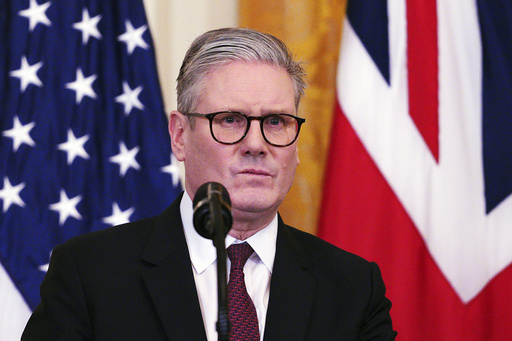WASHINGTON — Prime Minister Keir Starmer was all smiles as he returned to the United Kingdom on Friday after his visit to Washington. Although not all of his objectives had been achieved, his diplomatic efforts were certainly off to an impressive start.
Starmer aimed to persuade President Donald Trump to ensure security guarantees for Ukraine in any peace negotiations and to avert tariffs on British goods. Furthermore, he sought to cultivate a relationship with the unpredictable U.S. leader, whose political viewpoint and temperament contrast sharply with those of Starmer.
On a personal level, Starmer appeared to succeed. However, it remains to be seen whether his charm offensive will solidify U.S. support for Ukraine or stave off potential tariffs on British products.
In a warm and cordial reception at the White House, President Trump graciously welcomed Starmer, referring to him as “a special man” and highlighting their positive rapport. Sitting in the Oval Office, Starmer refrained from making any major declarations but managed to steer clear of any potential faux pas.
At a subsequent press conference, Starmer lavished praise on Trump, notably mentioning the return of Winston Churchill’s bust to the Oval Office — a move reversed by previous administrations. Despite their political differences, Starmer highlighted their shared sense of urgency in achieving results.
The British government’s preparation for this crucial meeting spanned several months, focusing on finding a delicate balance between cordiality, genuine admiration, and straightforwardness. Starmer walked this tightrope effectively, favoring positivity while tactfully addressing points of contention. He commended the president for creating an unprecedented opportunity to end the war in Ukraine, even as he avoided more controversial topics regarding Trump’s relations with Russia.
The positive reception of Starmer’s visit was evident in the British media, which largely lauded the diplomatic success of the trip. Headlines celebrated the budding camaraderie between the two leaders, with some dubbing it an “unlikely bromance.”
As for the situation in Ukraine, Starmer might have succeeded in influencing Trump’s stance or at least his rhetoric. Trump expressed newfound respect for Ukrainian President Volodymyr Zelenskyy, with whom he had previously been less flattering. Although a ceasefire agreement remains elusive, Trump tentatively suggested some reclaimed territory for Ukraine, hinting at a possible resolution.
Yet, Trump’s remarks contrasted with his Defense Secretary, Pete Hegseth, who advised Ukraine to temper its aspirations for full territorial recovery.
Starmer is scheduled to brief Zelenskyy and other European allies about his diplomatic endeavor when he returns to London on Sunday.
On the economic front, Trump hinted at the potential for a bilateral trade deal with the UK that could alleviate or eliminate threats of tariffs. However, he refrained from making any concrete commitments, commending Starmer’s negotiation skills but withholding definite promises.
Starmer emphasized the focus on developing a new economic partnership with an emphasis on advanced technology, marking Britain’s ambition to become a global leader in Artificial Intelligence and other innovative fields, alongside the U.S. and China. He reasserted the UK’s alignment more with the U.S. than the EU in technological development, advocating for harnessing opportunities rather than imposing restrictions.
Despite criticism from U.S. Vice President JD Vance concerning UK regulations on digital discourse, Starmer stood firm, expressing pride in the UK’s tradition of free speech.
In his efforts to charm, Starmer utilized a unique advantage — a royal invitation. He presented Trump with a formal letter from King Charles III, extending an invitation for a state visit at Balmoral, the royal family’s Scottish retreat. Trump, who had been hosted by the late Queen Elizabeth II in 2019, welcomed the invitation, lauding the king and complimenting Starmer’s British accent in jest.




